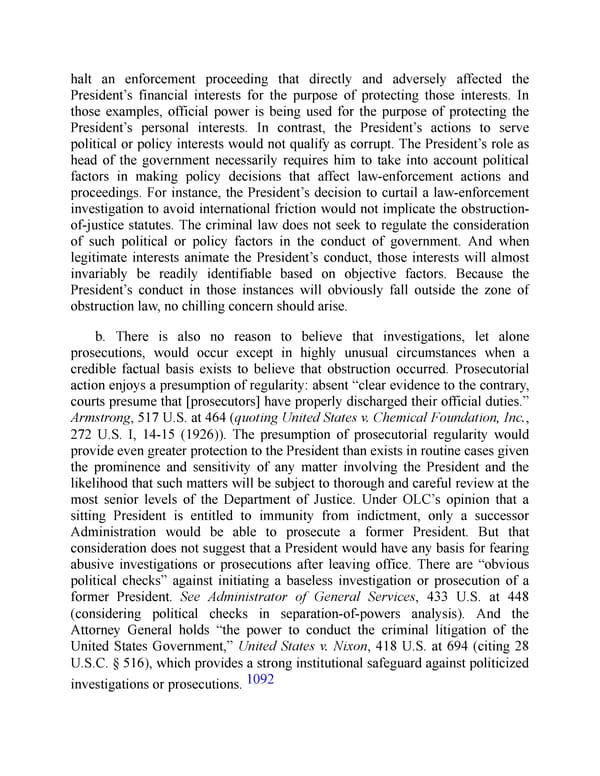halt an enforcement proceeding that directly and adversely affected the President’s financial interests for the purpose of protecting those interests. In those examples, official power is being used for the purpose of protecting the President’s personal interests. In contrast, the President’s actions to serve political or policy interests would not qualify as corrupt. The President’s role as head of the government necessarily requires him to take into account political factors in making policy decisions that affect law-enforcement actions and proceedings. For instance, the President’s decision to curtail a law-enforcement investigation to avoid international friction would not implicate the obstruction- of-justice statutes. The criminal law does not seek to regulate the consideration of such political or policy factors in the conduct of government. And when legitimate interests animate the President’s conduct, those interests will almost invariably be readily identifiable based on objective factors. Because the President’s conduct in those instances will obviously fall outside the zone of obstruction law, no chilling concern should arise. b. There is also no reason to believe that investigations, let alone prosecutions, would occur except in highly unusual circumstances when a credible factual basis exists to believe that obstruction occurred. Prosecutorial action enjoys a presumption of regularity: absent “clear evidence to the contrary, courts presume that [prosecutors] have properly discharged their official duties.” Armstrong, 517 U.S. at 464 (quoting United States v. Chemical Foundation, Inc., 272 U.S. I, 14-15 (1926)). The presumption of prosecutorial regularity would provide even greater protection to the President than exists in routine cases given the prominence and sensitivity of any matter involving the President and the likelihood that such matters will be subject to thorough and careful review at the most senior levels of the Department of Justice. Under OLC’s opinion that a sitting President is entitled to immunity from indictment, only a successor Administration would be able to prosecute a former President. But that consideration does not suggest that a President would have any basis for fearing abusive investigations or prosecutions after leaving office. There are “obvious political checks” against initiating a baseless investigation or prosecution of a former President. See Administrator of General Services, 433 U.S. at 448 (considering political checks in separation-of-powers analysis). And the Attorney General holds “the power to conduct the criminal litigation of the United States Government,” United States v. Nixon, 418 U.S. at 694 (citing 28 U.S.C. § 516), which provides a strong institutional safeguard against politicized 1092 investigations or prosecutions.
 Mueller Report PDF Page 511 Page 513
Mueller Report PDF Page 511 Page 513